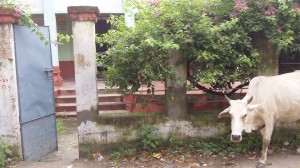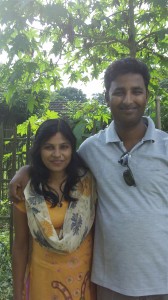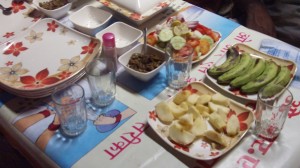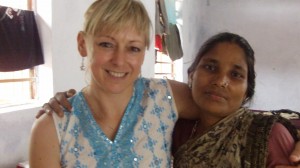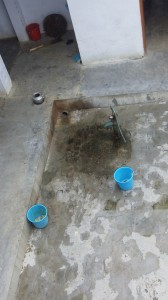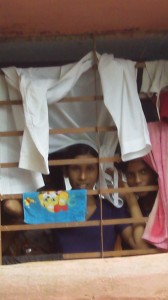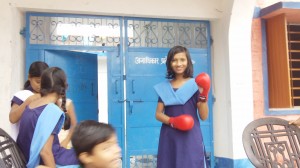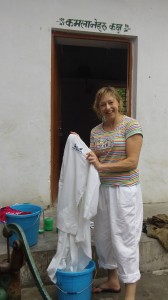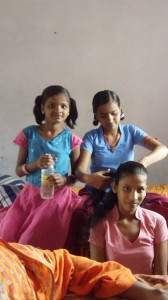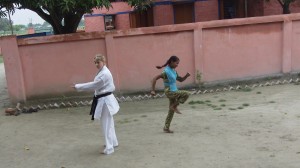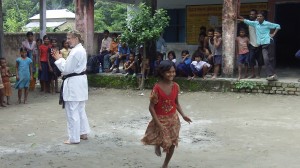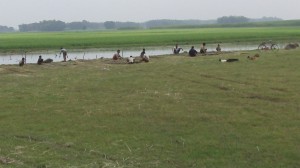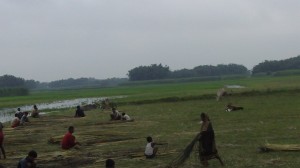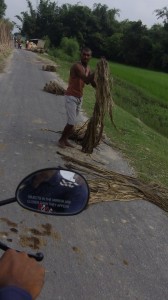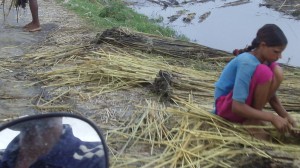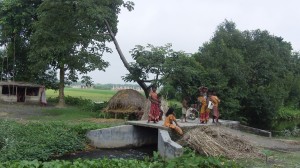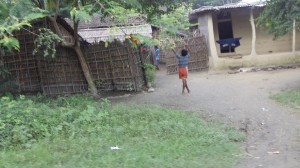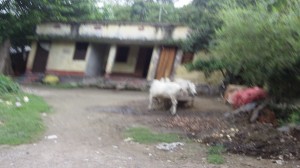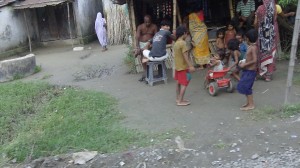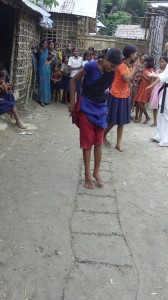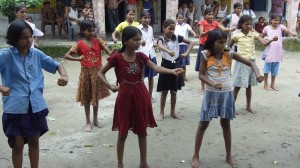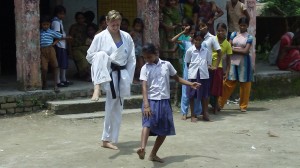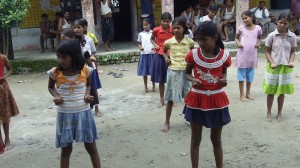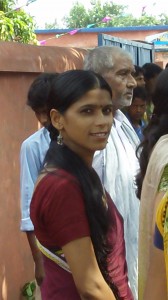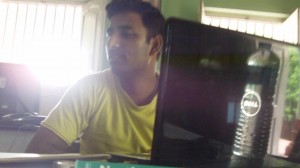Just when I thought it was going to be smooth sailing, of course things got tricky.
On September 7th, Tuesday morning, I started my journey home. It had rained the night before, and so the temperature had cooled and sleep came for a few hours. Heaven. I woke early to pack the last of my bits, and to fit in one last visit to KGBV – the girls had apparently been asking for me. It wasn’t to be, though, as my driver showed up late. In hindsight, definitely for the better.
I was accompanied on my three-hour journey to the airport by Praveen, an Apne Aap staff person, and his wife who were needing to see a doctor in Baghdogra. With the same driver I had had for my arrival in this land, we set off for my departure from it.
An hour and a half later, after passing through livestock auctions that choked the road more than the usual traffic would, we hit the West Bengal border, and shortly after that, our first warning. There was a small pile of rocks in the middle of an intersection, a droopy red flag stuck in the top of it. We stopped, and Praveen and the driver got out and walked over to a man who explained that the road was closed; apparently, there was something going on past this point where there were barricades and people were being pulled from their stopped cars and trucks and beaten. “What?” my mind screamed as I heard this. “This surely can’t be happening.” After a few minutes of discussion, Praveen, the driver, and myself agreed we would continue on, but at the first sign of real trouble, we would have to bail.
We continued down the road for another half an hour and were stopped again. This time, instead of a single gentleman giving the information, there was a group of about six guys. Praveen and the driver again got out of the car and headed over to the group to discuss our situation. After 5 minutes, and looking like nothing was being solved, I got out of the car and started walking toward the group. I was three paces away when our driver turned and intercepted me, led me back to the car, shortly thereafter joined by Praveen. “They have warned us, but we’re going to continue,” Praveen said. Mind you, at this point, I was seeing on the road motorbikes and bicycles – all other traffic such as trucks, buses, and jeepneys, anything that could transport people and goods had disappeared. But I was also seeing kids playing by the side of the road, people casually going about their harvesting work, storekeepers lazily manning their roadside stalls. No fear, no panic. In other words, no indication that anything dangerous was amiss. But still, what do I know? I am a foreigner here, with three people, and the only thing on my mind is “I HAVE to make it to the airport.”
Another half an hour down the road, another warning. This time, it is looking serious: trucks and buses line the road here. Again the scenario plays out: Praveen and the driver go to talk to the group of men, around 20 men. Five minutes goes by. Peering through the back window towards this grouping, I can see that things are going badly. This is serious, and it looks like the end of the road…for the car. I scan the area, and half a dozen motorbikes are visible. It would be uncomfortable, but I could make this last leg of the journey on the back of a motorbike if I had to. But before that, I would make an appeal…
I exit the car, and march across the road, right into the crowd of men, Praveen in a heated exchange with one of them. I look at Praveen, and I say in a loud voice, “Tell them that the U. S. State Department has my itinerary. They know when I am supposed to arrive in America. If I do not arrive in the United States when my itinerary says I am going to arrive, they will come looking for me. There is going to be a problem.” Praveen gets the gist of this, and hurriedly translates. I am not taking my eyes off of Praveen, not looking at any of the men that now surround me. But as I stand there, Praveen listens to the reply, and I can see on his face, they will not let us go. I now have 50 minutes before my flight leaves.
“Praveen Ji,” I say, “I understand that they will not let a car go, but what about a motorbike?” Seemlessly, Praveen switches tactics, and starts to ask the crowd if anyone would be willing to take me. There is, miraculously, a taker.
I hurry across the empty intersection back to the car with the driver. He opens the trunk, and I take out my 50 pound backpack and smaller 15 pound pack. The larger pack sits on my hips yet towers over my head by a good foot; to put it on requires me to perch it on a table, or in this case the back of the car, bend my knees and slide my arms through the straps, and then stand up and walk forward. Having done this, I am uncertain of how this is going to fair on the back of a motorbike, but I push any doubts I have aside. I am singular in focus: get to the airport.
I am standing next to the motorbike, its engine running, just about to strap the 15 pound pack around my front, when a man in military attire walks up to me from the direction of the group I interrupted earlier. He motions me back to the car. “I’m not getting in that car unless it is going to the airport,” I warn, my words wasted as it becomes clear this man does not speak English. Again he motions me away from the motorbike and toward the car. Praveen appears, and he says to get into the car, reassuring me it is okay, helping me take my backpack off and place it back in the trunk from which it came only two minutes ago. “Get in the car,” Praveen says, and I look at him doubtful, but he motions, and I’m in, and the driver settles in his seat as well. Some final words are exchanged between Praveen and the military guy, and then we are off…in the direction of the airport. I have 30 minutes to make my plane.
Praveen turns to me from the front seat and tells me that the military guy told him he is letting me get to the airport ‘in the interest of keeping good relations between India and the United States.’ He smiles, his eyes twinkling with amusement and I think relief. My little grandstanding worked. At this point, I don’t know what to think as we drive past mile after mile of tea fields, the mighty Himalaya stretching inky blue across the distant horizon. Will we be stopped again? What guarantee do we have?
As my mind wrestles with a myriad of conflicting emotions, sadness at leaving, relief at leaving, and the car makes it way, we are at the airport before I know it. Again, I am struggling with the backpacks, with good byes, with last minute photos. And then I am stumbling toward the terminal, which seems eerily empty.
One step into the terminal and I see a makeshift bunker constructed out of brick and covered by a blue tarp. Two machine guns are positioned on top, pointed at me. Well, not really at me, but at the doors I just rushed through. Soldiers and policemen are lingering in terminal’s hall, smoking or drinking tea. I hurry to the terminal door where a soldier is standing and asks for my ticket. After rummaging around, I am relieved to find it and hand it over. He glances at the piece of paper, then looks back to me: “Cancelled.” “What?” I ask, incredulous. “Cancelled,” he repeats. “All flights to Kolkata have been cancelled.” Oy.
